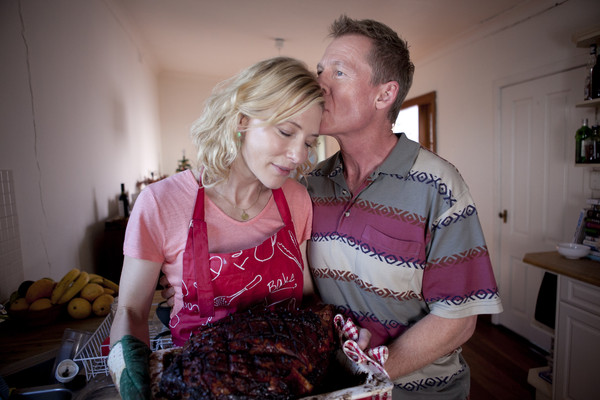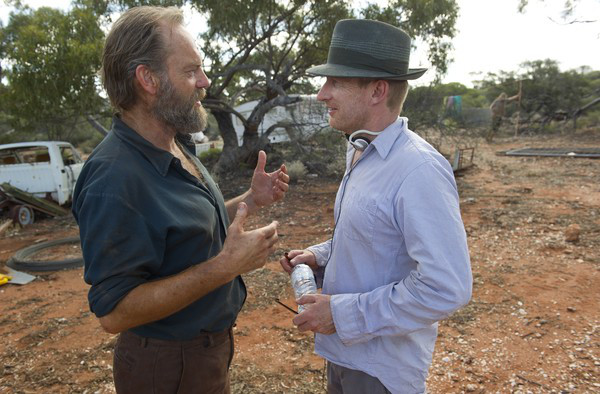What Even Is Tim Winton’s The Turning?
Three hours, seventeen Australian directors, and an intermission? This isn't a normal movie.

There was a moment, about two hours into The Turning — when Hugo Weaving strode onto the screen, luxuriantly bearded, and planted himself in the centre of the frame like a sturdy eucalypt — when I finally felt like I was in safe hands, if only for a short while.
The Turning (whose full title is Tim Winton’s The Turning, apparently) is an anthology of short films, each adapted from Winton’s short story collection of the same name, each by a different cast and crew. It’s being promoted as a ‘unique cinema event’ and is being trotted out to select cinemas where, for a slightly inflated ticket price, audiences will receive a lushly printed and very helpful information booklet, and, perhaps even more helpfully (given its three hour running time), an intermission.
There’s an impressive line-up of collaborators — from figures in local movies, video art, theatre and dance — but anyone using The Turning to take the temperature of Australian arts will find it veers hot and cold.
One Short Story = One Short Film, and the challenges of adaptation
Its core problem is conceptual. One Short Story = One Short Film seems like a simple formula, but the demands of adaption are more complex. Clear narratives and concrete dramatic situations are usually an important component in satisfying movies (even David Lynch movies), but they are not always ingredients in successful short stories, which might take the form of artfully brief studies of character, or place, or history.
Some short works, also, are so elegantly compressed that they truly do require a feature length running time to unpack. After all, Ray Lawrence’s Jindabyne (2006) allowed itself a leisurely 123 minutes to freely expound on Raymond Carver’s ‘So Much Water So Close To Home’. John Huston took 83 minutes to film James Joyce’s The Dead (1987).
Not having read Winton’s book, the pieces in The Turning that lost me were those that preoccupied themselves in trying to untangle the delicate, internal emotional and psychological states that can be confidently expressed in prose, but tricky to externalize on film. Some participating filmmakers turn to the abstract, like Yaron Lifschitz’s ‘Immunity’, which is told entirely through dance. Others reach for the numbingly literal, like ‘Big World’, from Warwick Thornton, director of Samson And Delilah (2009).
Portraying the post-high school malaise and life-changing road-trip of two friends, Lenny and Biggie, Thornton seems to have decided that the best way to tell his story is with long stretches of narration in which the protagonist redundantly describes the very events being enacted on screen, which have been staged and filmed with a baffling absence of craft. It feels like the most artistically inert kind of adaptation.
The strongest entries are the ones that lock into concrete dramatic situations. ‘Reunion’, directed and written by Sydney theatre impresarios Simon Stone and Andrew Upton, is a tidy little play in three acts, showing how a Christmas Day gone awry helps bond together a woman and her mother-in-law. Whereas other entries rely on montage and narration and ask very little of their casts, ‘Reunion’ — which is filmed in three, lengthy tracking shots by cinematographer Andrew Lesnie — places the onus on carefully composed dialogue and the intricately staged interplay between the actors.
‘Boner McPharlin’s Moll’, by Justin Kurzel, director of Snowtown (2011), finds success by simply skipping the demands of narrative adaptation altogether. Kurzel turns Winton’s story into a kind of documentary: a series of yarns told by what appear to be non-professional actors, filmed with a keen sense of place.
The difference between good acting and being entertaining
There’s something to like in most of the pieces, but past the ‘special event-ness’ of the format there’s a conspicuous lack of showmanship, as though Connelly and his collaborators felt that putting in dedicated effort is reason enough to ask an audience’s attention. In all its seriousness, The Turning sometimes forgets to be engaging.
Which is why, in a film of small performances, Hugo Weaving’s presence is a tonic. Weaving has years’ experience chewing the scenery in blockbuster productions like The Lord Of The Rings trilogy, and in David Wenham’s ‘Commission’, he feels fully in command of the screen. Even when he’s not speaking his jaw works silently, chewing the air, demanding attention. He has the confidence to go broad without going over the top. It’s a performance with something to say about the difference between good screen acting and being entertaining. It helps, also, that Wenham has surrounded him with crisp, cinematic compositions, and given him a well-formed character to deliver.
It might be unfair to point out that it’s the actors with international profiles who acquit themselves best. Rose Byrne also does good work finding the comedy in her battered, trailer trash mum character.
As an anthology film, The Turning is too inconsistent to be an unqualified success. As something like a group exhibit, it might be more palatable. Many of these pieces could be better served in an art gallery. Mia Wasikowska’s directorial debut, the whimsical ‘Long, Clear View’, is perfectly charming, but it’s out of sync with the rest of the entries, and it doesn’t have enough space to establish its own rhythm. Shaun Gladwell’s ‘Family’ might make for a neat exhibit, but as part of a film its mishandled narrative falls flat.
If nothing else, The Turning is probably value for money. Quantity counts for something, after all, as do good intentions. But they can’t ever fully satisfy.
–
Tim Winton’s The Turning is out in select cinemas nationally today.
–
James Robert Douglas is a freelance writer and critic in Melbourne. His work has been found in The Big Issue, Meanland, Screen Machine, and the Meanjin blog. He tweets from @anthroJRD

